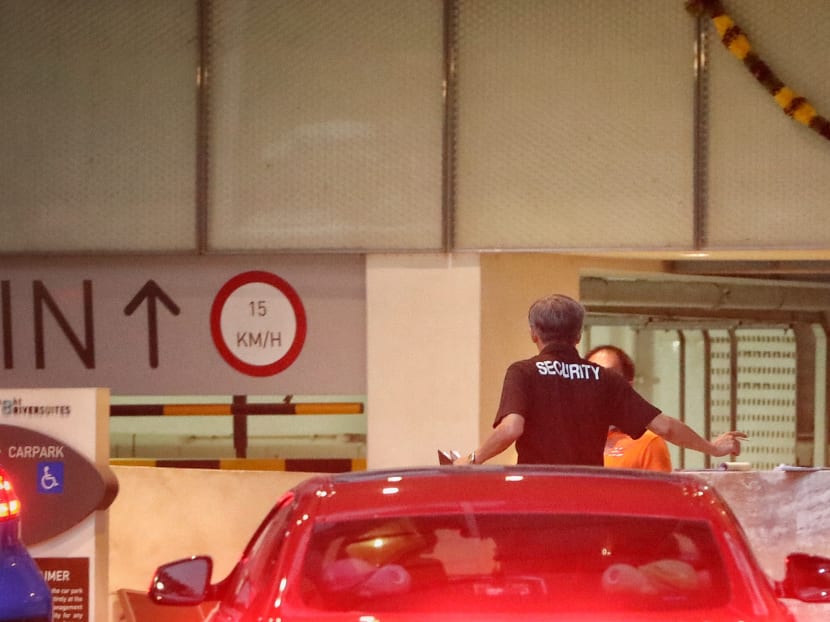The Big Read in Short: Condo security guards — disempowered, disrespected
SINGAPORE — Each week, TODAY’s long-running Big Read series delves into the trends and issues that matter. This week, we look at the deeper issues plaguing the security industry which has resulted in a difficult working environment all round for condominium security guards. This is a shortened version of the full feature.

A survey conducted by the Union of Security Employees in April revealed that 73 per cent of the 52 security officers surveyed have experienced either verbal or physical abuse while on the job.
Each week, TODAY’s long-running Big Read series delves into the trends and issues that matter. This week, we look at the deeper issues plaguing the security industry which has resulted in a difficult working environment all round for condominium security guards.This is a shortened version of the full feature, which can be found here.
SINGAPORE — Beyond rude residents and other day-to-day challenges which condominium security guards face, there are underlying problems that often leave them getting the short end of the stick.
These include the issue of liquidated damages, which refer to a fixed or determined sum of money agreed by the parties to a contract to be payable should there be a breach by any party.
The practice of liquidated damages is meant to protect a property from damages but union and industry leaders said it has been misused as fines to police the behaviour of security guards, or make them carry out tasks which they are not supposed to do.
Security guards and their agencies are punished for things as trivial as poor handwriting, failing to ensure that cars are parked within the designated line markings, and not responding quickly enough to WhatsApp messages from the condo management, for example.
Eric (not his real name), 44, who is a security officer at a condominium in Marine Parade, said his agency was fined twice in August — including for an occasion where the condo management saw a car that was not parked properly.
“We did not clamp the car and the management spotted it before us,” he said.
He told TODAY that on average, his security firm has to pay liquidated damages at least once a month. Each fine is either S$50 or S$100.
On Oct 31, the Union of Security Employees (USE) spoke out against the “peculiar practice”.
“Very often, the liquidated damages in the security industry are more like fines than actual reimbursements for damages suffered,” the union said in a Facebook post.
Such fines range from tens of dollars to a few hundred dollars for each incident, the union noted.
USE executive secretary Steve Tan said the imposition of liquidated damages became a standard industry practice likely as a result of the manpower crunch. As the security services are often bought on the basis of headcount, buyers use liquidated damages to ensure that that there is no shortfall of manpower for example, he said.
Security Association Singapore executive director Ikhsan Suri reiterated that managing agents are not well versed in contracting practices and do not have a strong grasp of how liquidated damages work.
He said: “They are almost always based on how ‘serious’ the managing agent or the Management Corporation Strata Title (MCST) thinks each alleged breach is, without any regard for the actual damage suffered by the client, which is the basis of liquidated damages.”
The plight of security officers — who often work long hours for relatively low pay and receive little recognition from the very people they serve — is back in the spotlight after a video, showing a resident of Eight Riversuites condominium in Whampoa verbally abusing a security guard, went viral late last month.
The incident has prompted Members of Parliaments to renew their calls for harassment laws to be extended to cover private security officers.

TODAY’s interviews with condo security guards found that they are often treated with little respect all round — not just in their day-to-day interaction with residents but also in terms of how they are expected to carry out their work, with the condo management policing their behaviours with fines.
And sometimes, the rules that they have to follow are as questionable as the by-laws which they are made to enforce on residents, said industry players.
Faced with an array of issues, it is no surprise that the industry is facing a manpower crunch. Nevertheless, following various initiatives to increase the appeal of the job, the situation has improved slightly in recent years.
Between 2015 and last year, the number of security officers with valid licences has increased from 73,700 to 79,800. As of September this year, the figure was 79,200.
Despite the overall uptick, the industry still needs more bodies.
Mr Robert Wiener, president of the Association of Certified Security Agencies (ACSA) and director of Prosegur Security, estimates that the industry may be facing a shortfall of about 12,000 workers. The use of technology will help to reduce the reliance on manpower and alleviate the manpower crunch over the next five years, he said.
RAMPANT ABUSE
A small scale survey of 52 security guards conducted by the USE in April found that about two-thirds had experienced verbal abuse, while less than a handful were physically abused.
Several of the security officers whom TODAY spoke to also said they have been verbally abused while on duty, but they felt that it was part and parcel of the job.
SMS Investigation and Security director John Sng noted that security officers are “sandwiched” and made messengers of bad news.
He cited an incident where a resident who was upset with the going-ons at a condo parked his car in front of the car park gantry and refused to move.
“When security officers tried to ask him to move, the resident said, ‘I don’t have to talk to you, you are just a security guard’. When the police came in, the police said it was a private matter. So there was no support from the police and MCST side,” Mr Sng said.
Mr Ikhsan said that without the force of law, security officers get “bullied” while trying to enforce a condo’s rules.
“These members of the public believe they can get away with it because security officers do not have the special protections despite being in a vulnerable front-facing position.," he added. "Often incidents of abuse or harassment of security officers do not go punished as they do not get support from the building owners or MCSTs or managing agents.”
To reduce the likelihood of a confrontation between angry residents and security guards, USE general secretary Raymond Chin suggested better-designed security procedures, clearer rules and the use of technology.
In a bid to reduce the number of abuse cases, the security officers in Mr Sng’s firm now wear body cameras. “I tell my officers, if they are (facing) a conflict situation, to tell the parties involved that they are being recorded,” he said.
Following the Eight Riversuites incident, the Security Industry Council (SIC) earlier this week launched an email helpline (stopabuse [at] hormatsecurity.com) for private security officers to report cases of verbal and physical abuse which they encounter while performing their duties. Assistance provided could range from legal advice to medical claims or requests to change deployment site.
Mr Wiener believes that on top of public education, legislation is also needed to protect security guards.
Many in the industry have been calling for private security guards to be accorded the same legal protection as public service workers such as nurses.
In response to TODAY’s queries, the Ministry of Home Affairs said that the harassment of anyone, including security officers, is “unacceptable” and an offence under the Protection of Harassment Act. Where there is violence or disorderly behaviour involved, victims are also protected under other legislation such as the Penal Code or the Miscellaneous Offences (Public Order and Nuisance) Act, the ministry said.
OUTCOME-BASED CONTRACTS — THE WAY FORWARD?
To tackle the root cause of the perennial issues plaguing the industry, many have called for the use of outcome-based contracts.
Currently, buyers put up a tender for services based on a fixed number of headcount under manpower-based contracts. Outcome-based contracts would not be as manpower-reliant, as security firms are assessed on expected performance levels and technological solutions can be used to offset a lower headcount.
The Government has announced that from May next year, all of its agencies will be adopting outcome-based contracts for all new security contracts.
Mr Chin said that security service buyers will need time to get onboard but the Government’s move will send a strong signal.
The MCSTs and managing agents whom spoke to TODAY cited several reasons for the resistance to outcome-based contracts, such as longer contractual commitments.
Mr Chan Kok Hong, who is the president of the Association of Strata Managers which seeks to represent managing agents for condos in Singapore, said that outcome-based contracts have not caught on because of the long period of commitment required from the buyers, due to the installation of equipment and technology.
Mr Andrew Lioe, director of property, strata and facility management company A4 International which oversees about 60 estates and commercial buildings, said that some of his clients still prefer the physical presence of security officers.
This is so because they “act as a better deterrence” compared to having closed circuit television cameras or supervision from a remote security centre. A security officer can physically check visitors and interact with them, Mr Lioe said.











